NUR5033 : Literature Review Assignment Help

Question
NUR5033: This assessment is a literature-review task, in which the students are required to select one nursing issue which should be identified in accordance with the issues the student observed in Penelope’s case. Penelope is an elderly lady who suffers from depression and faces several risk factors due to the same. Accordingly, the students should formulate a research question and develop a search strategy for its literature review. Finally, the students need to review the literature for the proposed research question.
Solution
The solution entails a detailed literature review for the research topic- “How does psychotherapy influence the outcomes related to depression among older adults aged 65 years and above?” The solution is sectioned into four parts: Firstly, an introduction to the case study and the identified research question is provided, followed by a background related to the issue identified by the student, search strategy defined for the review of literature on the identified topic, the review of literature, and a brief conclusion.
Our experts have written a brief introduction detailing the topic of assignment for which the literature review is to be conducted. Penelope’s case study is used for reference here.
Introduction
Depression is a prevalent mental health disorder that can impact individuals across various age groups, including older adults like Mrs. Penelope Philpott. Depression is identified by emotional symptoms, such as persistent feelings of sadness or hopelessness, and a lack of enthusiasm towards previously enjoyable activities (Stringaris, 2017). It can also cause physical symptoms such as fatigue, sleep disturbances, and changes in appetite (Paykel, 2022). Mrs. Philpott’s case presents several risk factors for depression, including the recent loss of her husband, limited social interactions, and chronic health issues such as diabetes and hypertension. These risk factors, combined with her recent hospitalization and limited mobility due to a fractured neck of femur, may exacerbate her feelings of sadness and loneliness.
This is only half of the introduction. Wish to read more about Penelope’s case? Call us now at +61871501720.
Next, a brief background is provided to introduce the readers to the issues. 50% of these solutions written by our experts are depicted below.
Background
The World Health Organization (2017) has reported that approximately 7% of elderly population aged 60 and above experience depression. In comparison, data from the Government of Australia reveals that more than 1 in 10 Australian older adults suffer from depression, and the likelihood of depression rises to 3 in 10 for elderly individuals living in assisted living facilities (Government of Australia, 2021). However, there are currently no official statistics available on the occurrence of depression specifically among the elderly in Victoria, Australia, on which the case study is based. Depression among older adults is diagnosed using a combination of methods, including self-reported symptoms, clinical assessments, and standardized rating scales (Krishnamoorthy et al., 2020). In many cases, depressive symptoms in older adults are often attributed to physical illnesses or disabilities, therefore healthcare providers should consider several factors while evaluating them for depression (Casey, 2017). These factors consist of alterations in mood or conduct, weariness or lethargy, changes in eating or sleeping habits, disinterest in activities, sentiments of worthlessness or remorse, and troubles with concentration (Sjöberg et al., 2017). Additionally, screening tools such as the Geriatric Depression Scale or the Patient Health Questionnaire-9 (PHQ-9) should also be used to aid in the identification of depression among older adults (Zhang et al., 2020). The current management of depression among older adults generally involves a combination of pharmacological and non-pharmacological interventions (Wilkinson et al., 2018). Under pharmacological intervention, antidepressant medications such as selective serotonin reuptake inhibitors (SSRIs) and tricyclic antidepressants (TCAs) are prescribed by a healthcare professional after a thorough evaluation of the individual’s medical history and symptoms (Krause et al., 2019).
Wish to read more? Just drop us an email at onlineassignmentservices1@gmail.com.
This is followed by the formulation of a research question according to the PICO framework. Keep reading to know how our experts have curated a specific and focused clinical research question in accordance to the problem identified in Penelope’s case.
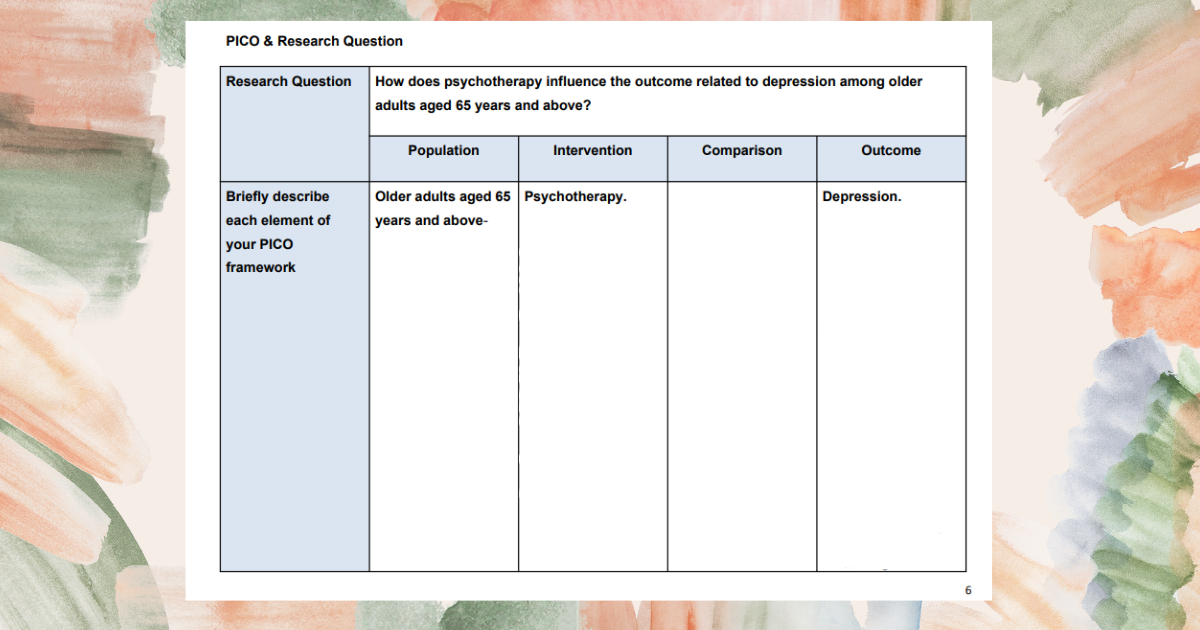
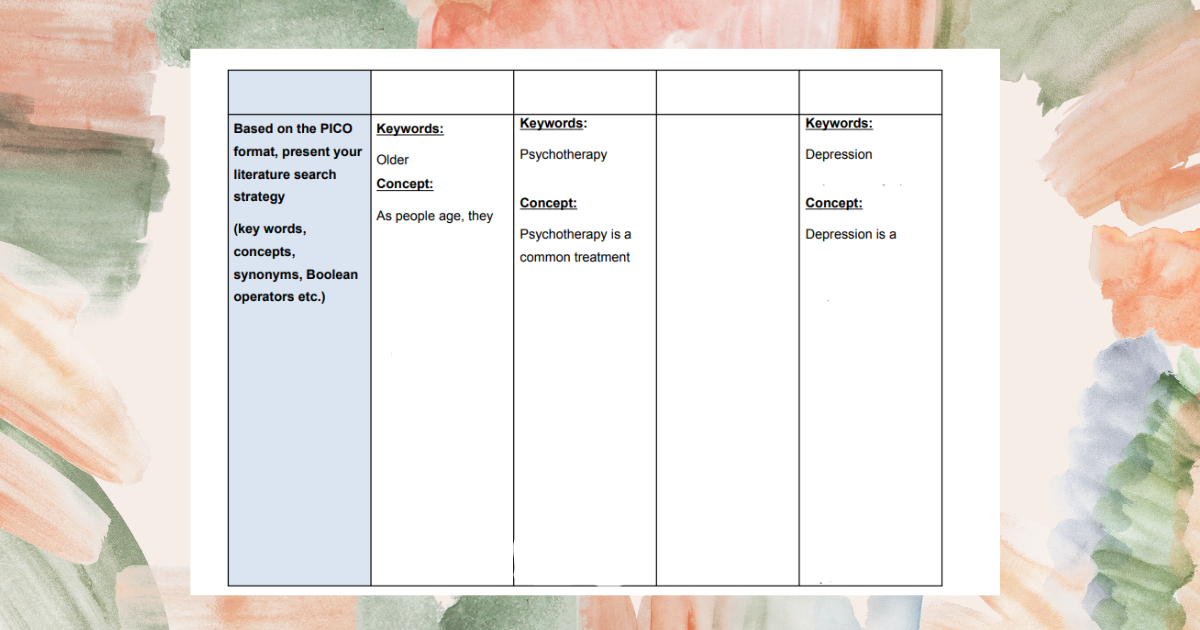
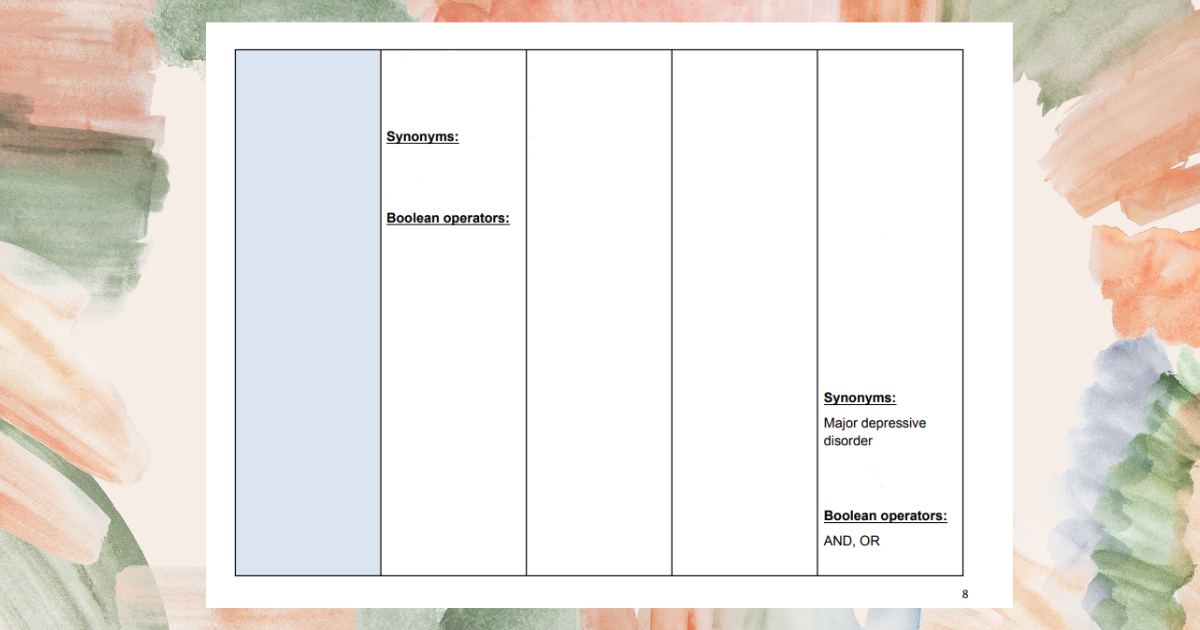

Still confused about PICO framework? Let us help you. WhatsApp us at +447956859420.
The next section requires the students to devise a search strategy for the literature review of the identified research question. Our experts make sure that the strategy is based on the PICO elements and the databases which are most relevant are incorporated in the search strategy as well.
Search Strategy
This literature review aims to explore the influence of psychotherapy on outcomes related to depression among older adults aged 65 years and above. Two research databases were searched for data:
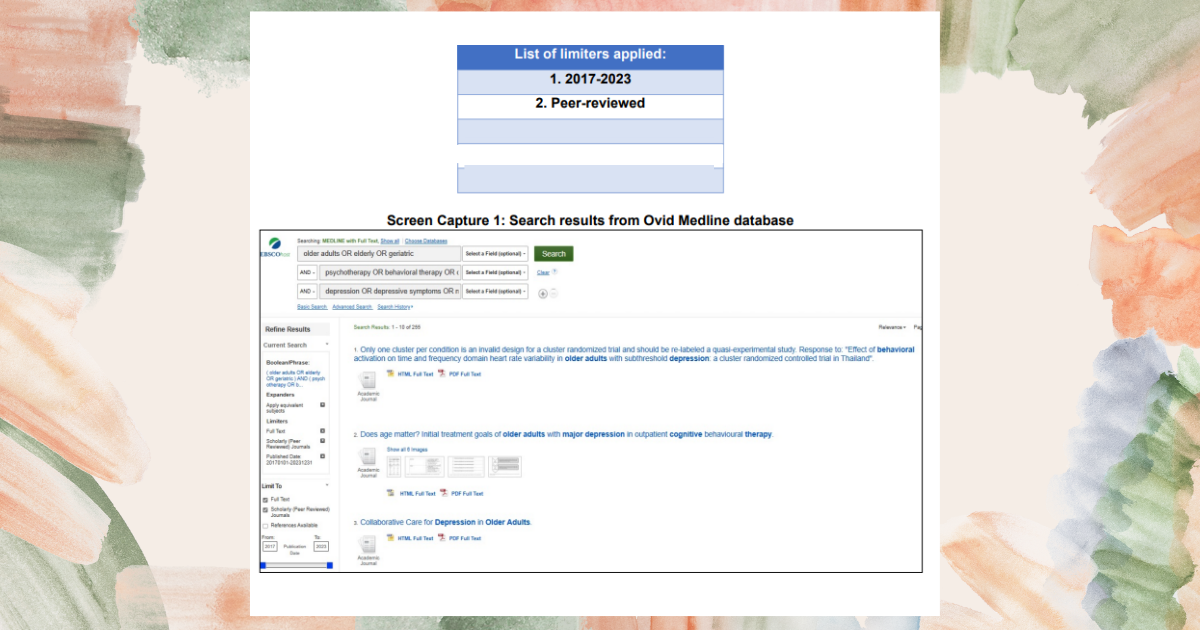
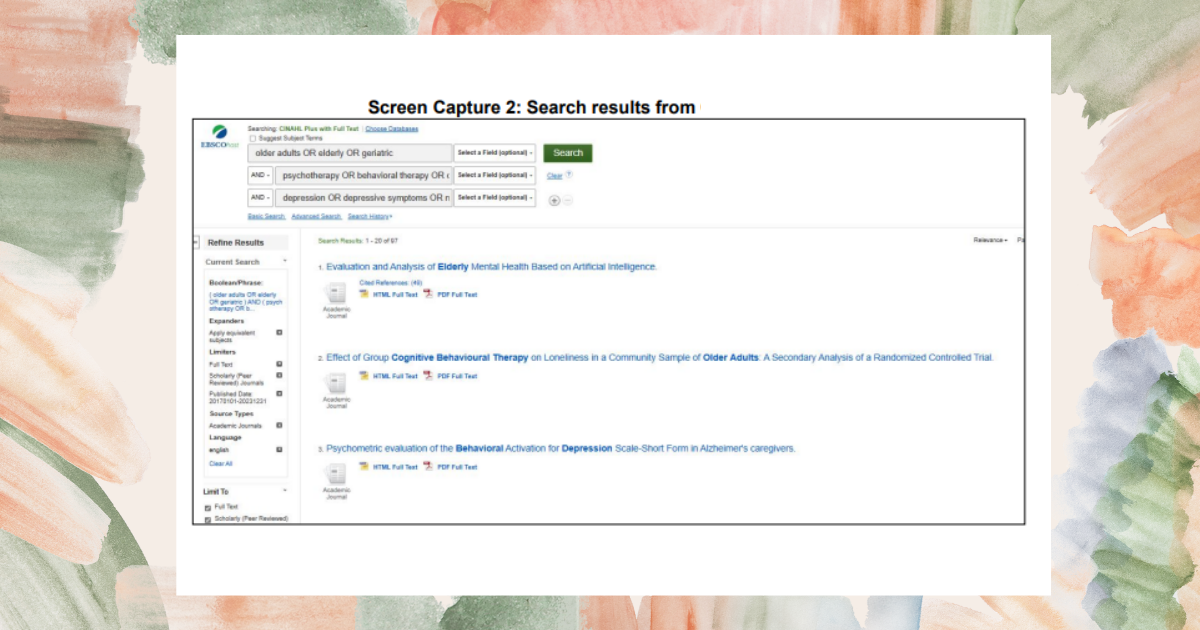
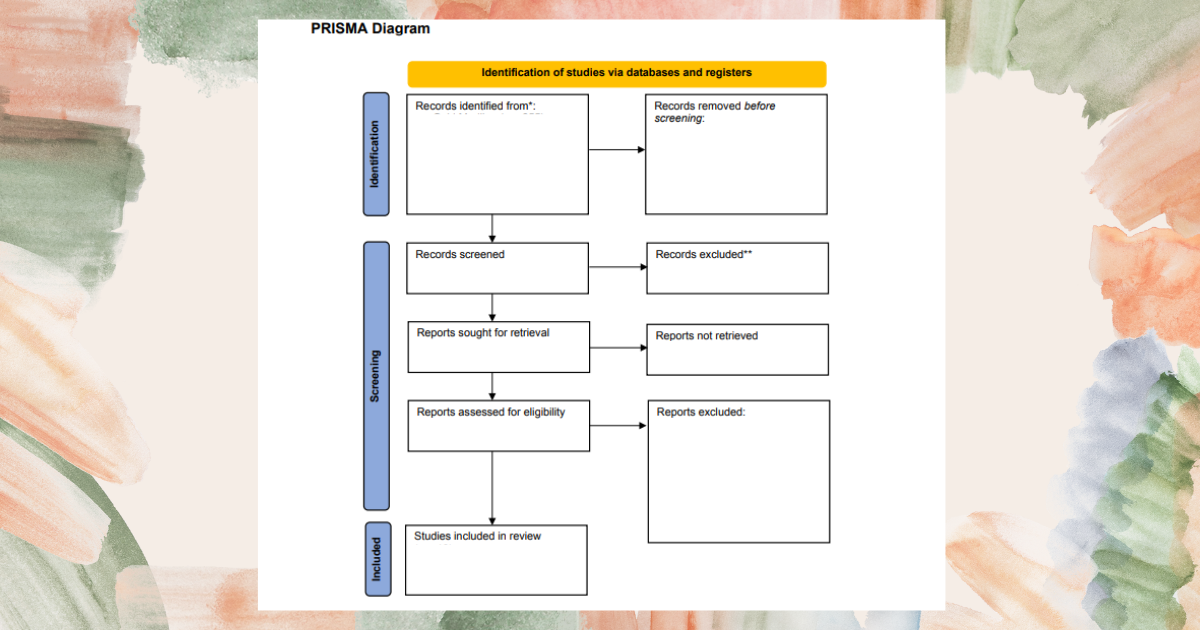
This is only a snippet of the search strategy outlined by our experts. Call us at +61871501720 to know more.
Next, the solution highlights the detailed literature review for the research question. Our experts have structured the review under different sub-sections. These include an introduction to depression among adults, the types of psychotherapy used in depression treatment for adults, effectiveness of psychotherapy on depression in older adults, the impact of psychotherapy on various depression-related outcomes, followed by a brief conclusion and its implications for future practice.
Review of the literature
Introduction
Despite the growing body of literature on the application of psychotherapy to treat depression among older adults, there is a need for a comprehensive review of the existing evidence in order to gain insights into the effectiveness and limitations of psychotherapy in this population, identify gaps in the literature, and guide future research and practice.
Types of psychotherapy used in treating depression among older adults
Various types of psychotherapy are available to cater to the different needs and preferences of older adults. A systematic review by Kok & Reynolds (2017) revealed that one of the most extensively used and well-researched psychotherapy among older adults is Cognitive Behavioral Therapy (CBT), which aims to help older individuals identify and change negative patterns of thinking that contribute to depression. This is also supported by a meta-analysis conducted by Cuijpers et al. (2021) which ranks CBT as the most acceptable form of psychotherapy for all adults, including older adults. However, there are other forms of psychotherapy that are also used to treat depression in this population, such as problem-solving therapy (PST) and interpersonal therapy (IPT) (Azariah et al., 2019; Kok & Reynolds, 2017).
Effectiveness of psychotherapy on depression in older adults
Numerous studies have demonstrated the efficacy of psychotherapy as a treatment for depression in older adults. According to Chen et al. (2021), 70% of older adults with depression do not comply with their antidepressant regimen due to concerns about side effects. Therefore, non-pharmacological interventions such as physical activity, music intervention and psychotherapy, are a preferred method of treatment for improving symptoms of depression among the elderly. This study also found that among all the non-pharmacological interventions commonly used in the treatment of depression, psychotherapy results in statistically greater improvement in the symptoms of 17depression among the elderly (Chen et al., 2021). This is also supported by Werson et al. (2022) whose study has identified psychotherapy as a first-rank treatment for mild to moderate depression among older adults, the effectiveness of which is comparable to the efficacy of antidepressant medications.
The influence of psychotherapy on various depression-related outcomes in older adults
Psychotherapy has been shown to have a positive impact on depression-related outcomes in older adults, including reducing symptoms of depression, improving quality of life, and enhancing social functioning. According to Haigh et al. (2018), depression in older adults can cause emotional symptoms like persistent sadness, hopelessness, and 18guilt, as well as cognitive and behavioral symptoms, including difficulty with concentration, decision-making, and changes in sleep and appetite. In addition, physical symptoms such as fatigue and headaches may also arise, and social isolation can further exacerbate the issue (Haigh et al., 2018). A study by Siverová & Bužgová (2017) shows that psychotherapy improves cognitive functions among the depressed elderly by teaching them various strategies to recognize and challenge their negative beliefs, develop more balanced thinking patterns, and improve their ability to solve problems and make decisions. Consequently, psychotherapy improves cognitive symptoms of depression, such as difficulty concentrating, making decisions, and remembering things.
Conclusion
This LR provides a comprehensive analysis of the application of psychotherapy in treating depression among older adults. The review discusses the various types of psychotherapy available for older adults, including Cognitive Behavioral Therapy (CBT), problem-solving therapy (PST), and interpersonal therapy (IPT). Of these, CBT is the most widely researched and used form of psychotherapy for treating depression among older adults.
Translation to practice
With regards to Mrs. Philpott’s case study, the first implication of the LR’s findings for future nursing practice is to effectively recognize the indications and manifestations of depression in older adults. As explained in the LR, depression can manifest itself through signs such as persistent sadness, loss of appetite, and other lifestyle changes, such as declining self-care. Therefore, nursing professionals must first learn to recognize the signs and symptoms of depression in the elderly, without dismissing them 20as a ‘normal’ part of ageing. The second implication for nursing professionals with respect to the case study would be to identify the best-suited psychotherapeutic approach to manage their depression as per the unique needs and situations of the elderly patients.
Do you also feel stuck with your literature review assignments? Let us help you. WhatsApp today- +447700174710.

